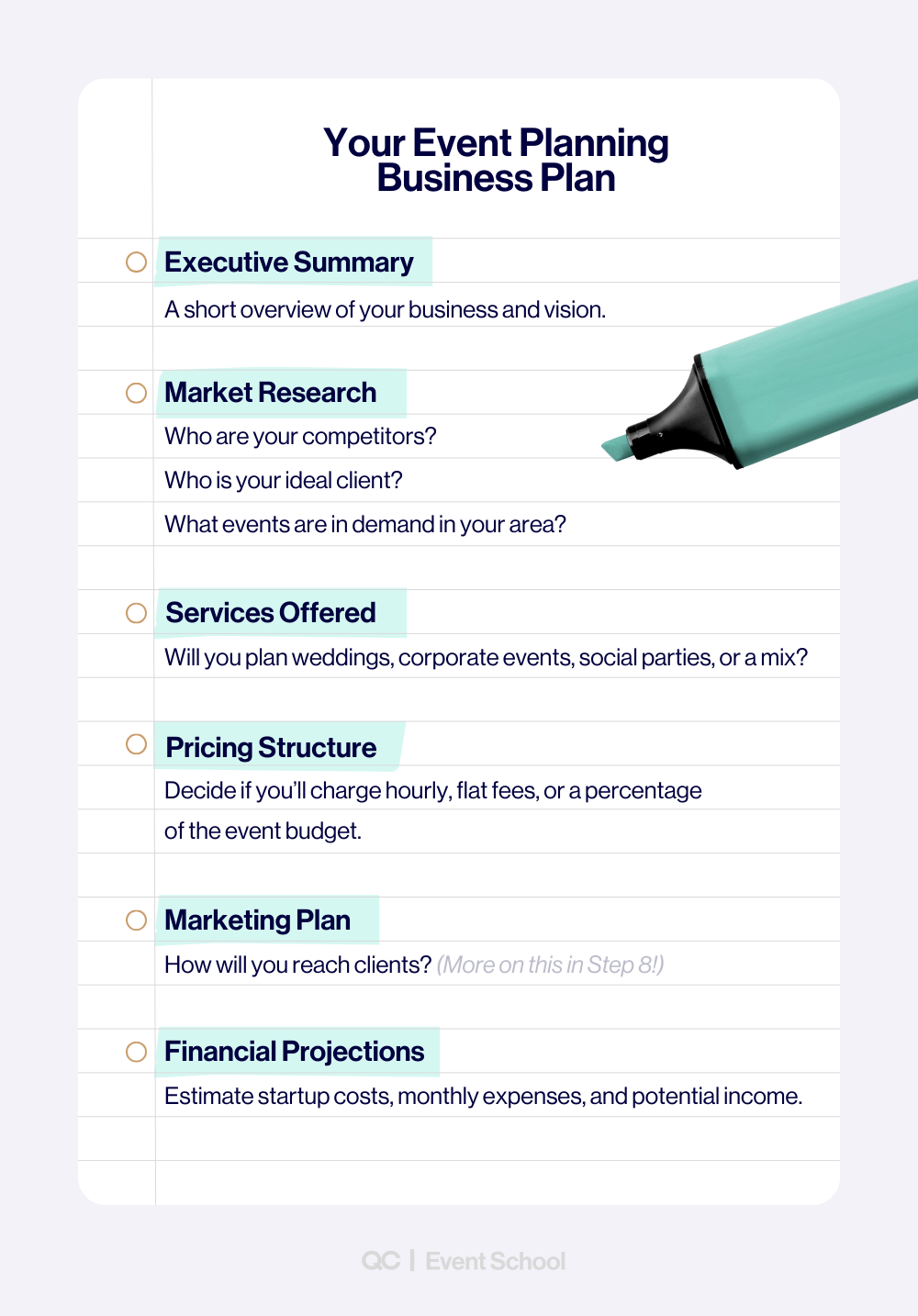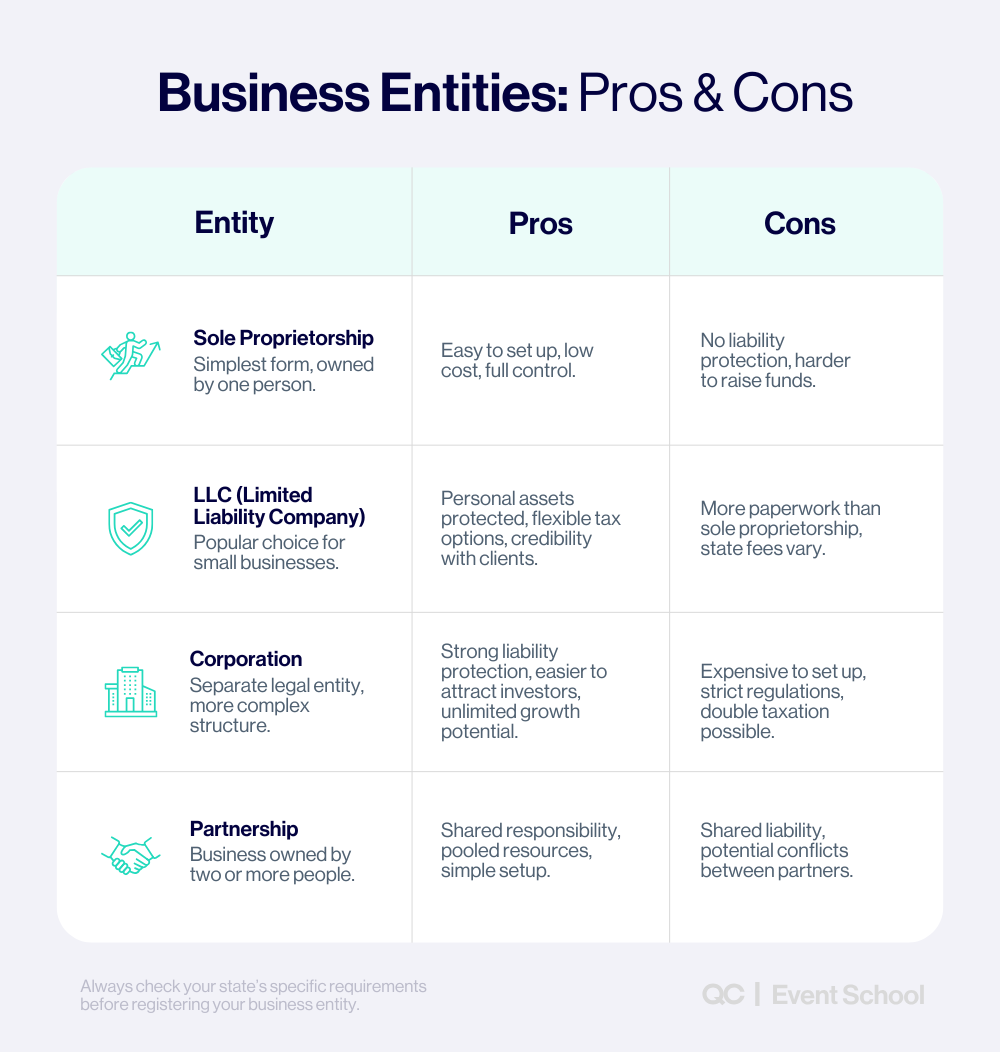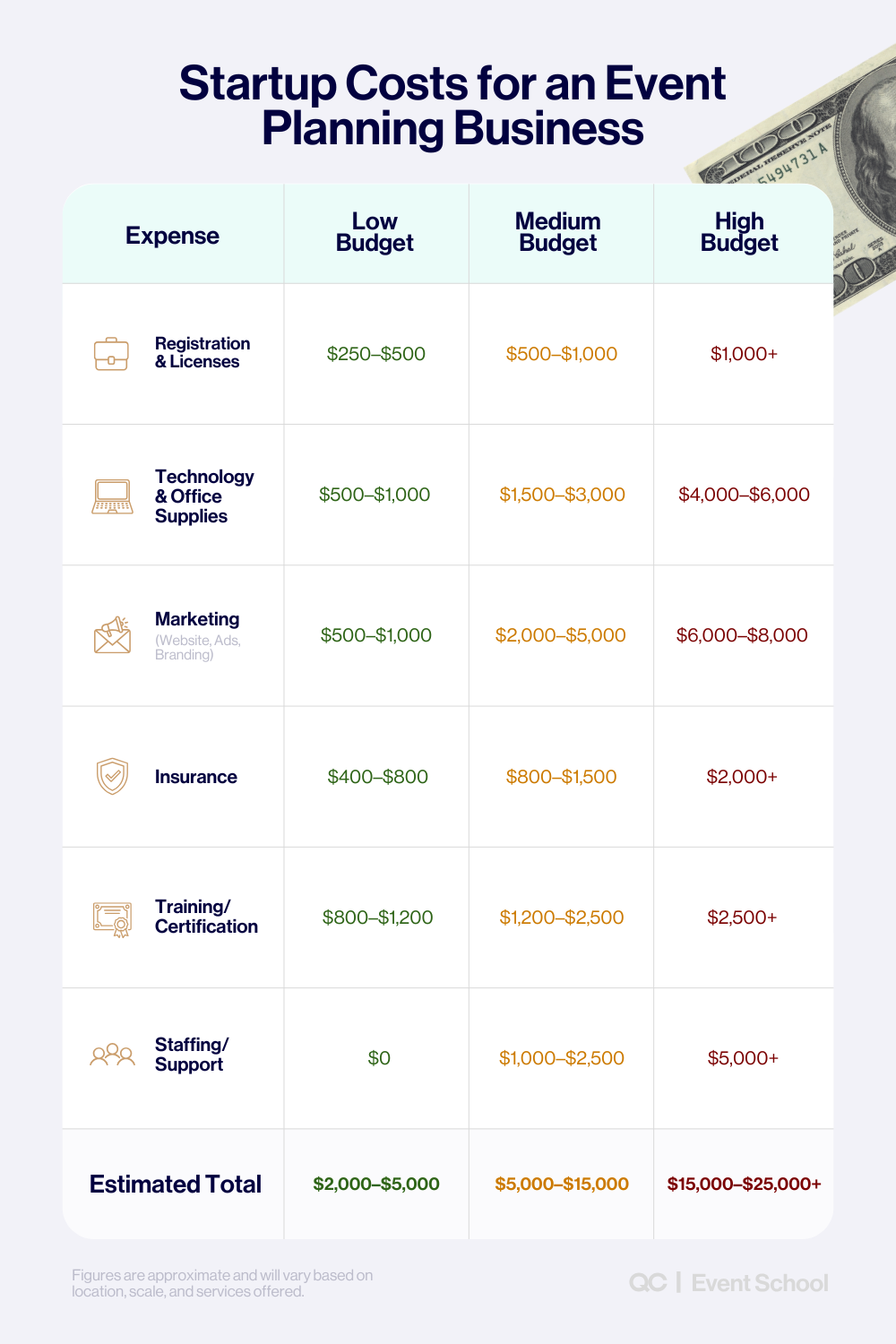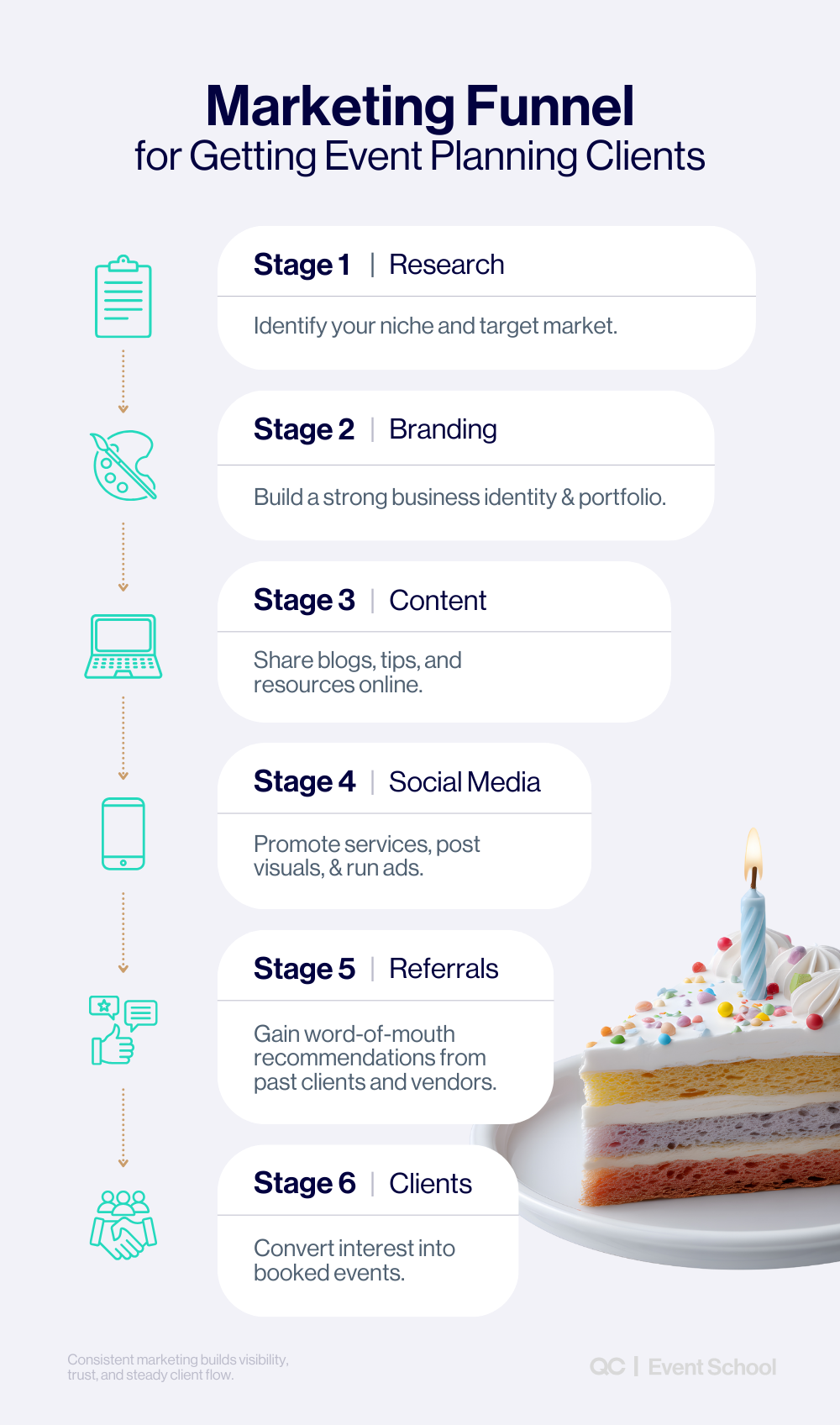
Business, General Tips, Helpful Resources, Your Event Career
How to Start an Event Planning Business (Step-by-Step Guide)
How To Start an Event Planning Business: Key Points
- Write a clear event planning business plan.
- Choose your niche and target market.
- Register legally and manage startup costs.
- Build your brand, network, and client base.
- Keep learning, marketing, and scaling to grow.
Introduction
Starting your own event planning business can be both exciting and overwhelming. If you love planning parties, organizing details, and bringing people together, this career could be the perfect fit! But where do you start if you’ve never run a business before?
The truth is, launching an event planning company doesn’t have to be scary. With the right roadmap, you can turn your skills into a profitable business. In this guide, you’ll learn step by step how to start an event planning business, create an event planning business plan, get clients, and scale for long-term success.
To make this even more valuable, I’ve also sat down with multi-certified QC Event School graduate, Tyler Reid, to hear his personal insights on starting and running a successful event planning business. Tyler’s story shows exactly what’s possible with determination, creativity, and the right training.
So, keep reading to discover not only the steps you need to take, but also real-world advice from someone who’s built his own thriving event planning career!

Photography by Jordan Viision
Meet Tyler Reid, Owner & Founder of Eminent Events
Tyler Reid is a certified International Event and Wedding Planning Professional™ (IEWP™), Luxury Wedding and Event Specialist (LWES), and Destination Wedding Specialist (DWS). Based in Atlanta, Georgia, he founded Eminent Events with the mission of creating unforgettable and “unconquerable” celebrations.
Tyler’s goal is to become a mainstream celebrity wedding and event planner. His company produces a wide range of events, from weddings, Bar/Bat Mitzvahs, and Quinceañeras to album release parties, galas, and corporate functions. Inspired by sharing a birthday with Nelson Mandela, Tyler lives by Mandela’s words: “A winner is a dreamer who never gives up.”
Through Eminent Events and his work with youth groups, Tyler encourages others to “Name It, Claim It, & Go Get It.” His vision is to inspire clients to hire planners for their expertise and to deliver events where every client feels like the guest of honor.
First Things First: What Does an Event Planning Business Involve?
Before we dive into the steps, let’s first talk quickly about what an event planner actually does. After all, event planning isn’t just about picking flowers or choosing a theme. Rather, it’s about managing EVERY moving part that makes an event successful.
For instance, event planners work on:
- Corporate events: meetings, conferences, product launches.
- Weddings: from intimate ceremonies to luxury celebrations.
- Nonprofit events: galas, fundraisers, charity drives.
- Social/private events: birthdays, anniversaries, reunions, community events.
Furthermore, key responsibilities often include:
- Researching venues and vendors.
- Building budgets and timelines.
- Coordinating decor, entertainment, and catering.
- Handling contracts, insurance, and permits.
- Managing logistics like seating, transport, and schedules.
- Supervising the event on the day.
In short, an event planning business is about turning ideas into reality while making sure everything runs smoothly. It’s a mix of creativity, organization, and problem-solving. By knowing the wide range of services at your disposal, you can start shaping your event planning business plan around the type of work that excites you most!
Starting an Event Planning Business: 9 Steps to Success
If you’re ready to turn your passion for organizing events into a profitable career, you’ll need a clear plan. In this section, let’s break down 9 practical steps on how to start an event planning business. Each step will guide you through the process of building, launching, and growing your business with confidence.
Step 1: Write Your Event Planning Business Plan
Every successful business starts with a plan, and this very plan is your foundation. It’ll guide your decisions, attract clients, and help you stay organized.
Your event planning business plan should include:

Keep it simple but specific. You don’t need a 50-page plan. Rather, even a 5–10 page outline is enough to get started.
Why This Matters:
- A business plan keeps you focused.
- It shows clients and investors you’re serious.
- It also helps you plan for profit, not just survival.
Example (for Inspiration):
Let’s say that your niche is weddings. In this case, your business plan might highlight partnerships with local florists and venues, as well as pricing for wedding coordination packages. Additionally, you’ll probably also want to include your projected income from handling X number of weddings in your first year.
This first step is also a great time to explore certification and training! While not mandatory/required, credentials (like those from QC Event School) will help build trust and show clients you’re prepared. It’s one of the easiest—yet most impactful—ways to stand out from day one!
Step 2: Choose Your Niche and Target Market
Not every event planner does the same type of work. That’s why it’s important to define your niche and target market early on. This will help you focus your services, stand out from the competition, and attract the right clients.
Here are a few popular event planning niches you can consider:
- Weddings: Full planning, day-of coordination, destination weddings.
- Corporate events: Conferences, trade shows, product launches, office parties.
- Nonprofit events: Fundraisers, galas, community projects.
- Social/private events: Birthdays, anniversaries, family reunions, graduations.
- Luxury events: High-end weddings or exclusive corporate gatherings.
Choosing A Niche Matters Because It:
- Makes your marketing clearer and more effective.
- Allows you to specialize in what excites you most.
- Helps you build expertise and charge higher rates.
Example (for Inspiration):
If you love party planning, your target market could be families looking for help with birthdays, graduations, or milestone celebrations. On the other hand, if you thrive on corporate logistics, your target market could be local businesses planning conferences and launches.
By identifying your niche and market from the start, you’ll know exactly who to market to and how to price your services. By tackling this step thoroughly, you’ll be set up for smooth operations and peace of mind. This step also connects directly to your event planning business plan, since your chosen niche will guide your goals and strategies.

Photography by A Love Experience.
Step 3: Register Your Business and Understand Legal Basics
Next, once you know your niche, it’s time to make your business official! This step can feel intimidating, but it’s essential for protecting yourself and your clients. Moreover, by tackling this step thoroughly, you’ll be set up for smooth operations and peace of mind.
Here’s what you need to consider:
-
- Choose a business name: Pick something simple, memorable, and professional.
- Select your legal structure: Most event planners choose either:
- Sole Proprietorship (easy, but offers no liability protection).
- LLC (popular choice; protects your personal assets).
- Corporation (more complex; often for larger businesses).
- Register your business: File with your state or local government.
- Get an EIN: An Employer Identification Number from the IRS. This helps with taxes and hiring employees.
- Licenses and permits: Check your city and state rules to make sure you comply.
- Insurance: General liability insurance is a must to protect yourself if something goes wrong at an event.

Example (for Inspiration):
If you’re aiming for corporate event planning, registering as an LLC is a smart choice. This structure will help protect your personal assets in case of contract disputes, and it also makes you look more professional to companies who expect formal agreements.
Step 4: Understand Startup Costs and Financial Planning
Every business has startup costs, and event planning is no different. By understanding this initial investment, you’ll be able to make smarter financial decisions and avoid unpleasant surprises.
The good news? You don’t need a ton of money to get started—especially if you’re starting from home!
Common expenses include:
- Business registration and licenses.
- Office supplies and technology (computer, phone, software).
- Marketing (website, social media ads, business cards).
- Insurance.
- Training or certification (optional, but highly recommended).
Here’s a sample cost range for your first year:
- Low budget: $2,000–$5,000 (working from home, solo operation).
- Medium budget: $5,000–$15,000 (small office, some staff support).
- High budget: $15,000–$25,000+ (larger team, multiple events, equipment rentals).

Why This Step Matters:
- You can set realistic expectations.
- It guides your pricing (covered in Step 6).
- It prepares you to invest wisely as your business grows.
Example (for Inspiration):
If you’re starting out in the nonprofit event niche, you may need a larger initial marketing budget. Fundraisers and galas often require printed materials, donor outreach, and professional photography. This means your early costs might be higher than someone starting with small social events.

Photography by Forever Photography by Danielle Hollins.
Step 5: Build Your Event Planning Brand
Your brand is more than just a logo. It’s the image clients will remember and the reason they choose you over competitors. A strong brand makes your event planning business look polished and professional from day one.
When building your brand, focus on:
- Business name: Simple, memorable, and relevant to your niche.
- Logo and visuals: Consistent colors, fonts, and style across all materials.
- Website: Clear services, testimonials, and a contact form.
- Portfolio: Photos and descriptions of events you’ve planned (or styled mock-ups if you’re brand new).
- Social media presence: Post event inspiration, planning tips, and behind-the-scenes stories.
This Matters Because Strong Branding:
- Helps you stand out.
- Builds trust with potential clients.
- Makes your business look established, even if you’re just starting out.
Example (for Inspiration):
Say, for instance, your goal is to be a luxury event and wedding planner. Your brand identity should reflect elegance and signal sophistication to high-paying clients! Therefore, use a sleek logo, premium website design, and high-quality photography.
💼 Start an Event Planning Business In As Little As 3 Months
Get certified + book your first client in as little as 12 weeks with QC Event School.
Step 6: Create Packages, Pricing, and Contracts
Now that your brand is taking shape, it’s time to decide how you’ll get paid. Your pricing and packages should reflect your experience, your niche, and the value you provide.
Here are the most common pricing models for event planners:
- Hourly rate: Best for consultations or small tasks.
- Flat fee: Great for specific services (like “day-of coordination”).
- Percentage of event budget: Often used for larger weddings or corporate events.
- Tiered packages: Bronze, Silver, Gold options with different levels of support.
With this in mind, your contracts should also include:
- Services provided.
- Payment terms and deadlines.
- Cancellation policy.
- Liability disclaimers.
Your Business Contract Is Essential Because:
- Clear pricing prevents misunderstandings.
- Packages make it easier for clients to choose the right fit.
- Contracts protect both you and your clients.
Example (for Inspiration):
Those specializing in destination weddings might offer packages that include travel coordination, vendor management abroad, and cultural expertise. Not to mention, because these events require extra planning, fees can be higher than standard weddings.

Photography by Stanlo Photography.
Step 7: Build Your Professional Network and Vendor Relationships
No event planner works alone. Success in this industry depends on having strong, reliable vendor partners.
Vendors you’ll likely work with include:
- Venues.
- Caterers.
- Florists.
- Makeup artists.
- Photographers/videographers.
- DJs or live bands.
- Rental companies.
Consider these tips for building solid professional relationships:
- Attend networking events in your city.
- Join professional associations like MPI or ILEA.
- Always pay vendors on time and treat them with respect.
- Recommend vendors you trust, and they’ll return the favor.
Why This Matters:
- A strong network saves time and stress.
- Good vendor relationships lead to referrals.
- It positions you as a reliable professional in your community.
Example (for Inspiration):
If you’re drawn to festivals and live events, your vendor list may include stage rental companies, lighting crews, and security teams. Building these connections ensures you can deliver safe, smooth, large-scale experiences.
Step 8: How to Get Clients for Your Event Planning Business
When you boil it all down, clients are the heart of your business! Without them, you won’t grow. Thus, learning how to get clients for your event planning business is one of the most important steps in this guide.
Ways to find clients include:
- Referrals: Ask satisfied clients and vendors to recommend you.
- Networking: Attend bridal shows, business expos, and local meetups.
- Online marketing: Use social media ads and SEO-friendly blog posts.
- Partnerships: Team up with venues or caterers who can refer clients.
- Testimonials: Collect reviews and display them on your website.
Client Acquisition Is Key Because:
- Consistent client flow = consistent income.
- A smart client strategy keeps your calendar full.
- Building a reputation takes time, but every new client moves you forward.
Example (for Inspiration):
In corporate event planning, many clients come through networking. Joining your local Chamber of Commerce or attending business networking events can quickly put you in front of decision-makers.

Step 9: Market and Scale Your Event Planning Business
Lastly, the final step is about growth. You’ve built your foundation—now it’s time to expand!
Here are some ways to market your business:
- Social media: Post event photos, behind-the-scenes clips, and planning tips.
- SEO and blogging: Write articles that answer client questions (just like this one).
- Email newsletters: Share updates, promotions, and success stories.
- Paid ads: Use Google Ads or Facebook Ads to target your niche market.
And here are some ways you can scale your event planning business over time:
- Hire assistants or junior planners.
- Expand to new markets (weddings → corporate, or vice versa).
- Offer new services, like event decor or destination planning.
- Create digital products (checklists, templates, mini-courses).
Why This Matters:
- Marketing keeps your business visible.
- Scaling increases your income potential.
- A growth mindset ensures long-term success.

Photography by Daniel Lee.
Example (for Inspiration):
If your focus is social/private events, you might start by planning birthdays. Over time, you could scale by offering milestone packages—birthdays, graduations, anniversaries—so your clients stay with you for years.
Why Start an Event Planning Business? (Opportunities & Benefits)
Starting an event planning business is about building a career that’s rewarding, flexible, and full of opportunity. The demand for event planners continues to grow worldwide, with no signs of stopping anytime in the future!
Here are some of the top reasons to start your business now:
- High demand: People need help with weddings, corporate events, fundraisers, and private celebrations. Busy schedules mean more clients are willing to pay for professional support.
- Flexibility: You can start part-time, work from home, or grow into a full-scale company with employees.
- Creativity: Every event is a new canvas. You’ll design unique experiences tailored to your clients’ vision.
- Personal satisfaction: Seeing a client’s face light up at a successful event is one of the best rewards in the industry.
- Income potential: Once established, event planners can charge premium rates (especially if they specialize in weddings, corporate, or luxury events).
- Career growth: You can expand your services, hire a team, or even branch into related areas like event decor, destination weddings, or festival planning.
Essential Skills Every Event Planner Needs
Event planning is exciting, but it also demands a unique mix of skills. The stronger your skills, the more confident you’ll feel when launching your business! Competitor articles listed a few qualities, but here we’ll expand with more depth and tie them to real-world success.
Here are the top skills every event planner should build:
These skills don’t just help you run great events; they also help you stand out to clients. And while some skills can be learned through experience, many can be developed faster with professional training. Programs like QC Event School’s online certifications give you the tools and confidence to deliver professional-quality events right from the start!
✨ Learn What It Takes To Start (and Run) an Event Planning Business!
Every QC Event School course comes with a business unit to best prepare you for long-term success.
Challenges to Expect (and How to Overcome Them)
Starting an event planning business is exciting, but it isn’t without its challenges. Knowing what obstacles to expect, and how to overcome them, will help you stay confident and prepared.

Photography by Stanlo Photography.
Here are some of the most common challenges new planners face:
1. Time Management
Events involve juggling vendors, clients, and schedules.
Solution: Use planning software and detailed checklists to stay organized. Prioritize tasks and delegate when needed.
2. Budget Constraints
Clients often want a grand event on a small budget.
Solution: Learn creative ways to stretch dollars, negotiate with vendors, and set realistic expectations from the start.
3. Vendor Issues
Not every vendor is reliable. Some may cancel or underdeliver.
Solution: Build a trusted vendor list and always have backups in place. Strong relationships mean fewer surprises.
4. Stress Management
Event days can be high-pressure, with lots of moving parts.
Solution: Stay calm, keep communication open, and trust your plan. Stress management techniques—even simple breathing exercises—can help.
5. Competition
Many markets already have established event planners.
Solution: Differentiate your business with a clear niche, strong branding, and professional certification that proves your expertise.
Challenges will always come with running a business, but they don’t have to hold you back! By planning ahead and staying adaptable, you’ll turn potential problems into opportunities for growth and success.
Conclusion: Your Next Step to Becoming a Certified Event Planner
Starting your own event planning business may feel like a big leap, but with the right steps, it’s completely achievable. You’ve learned how to write an event planning business plan, choose your niche, manage startup costs, build your brand, and start attracting clients. You also know what challenges to expect, and how to overcome them with confidence.
The Next Step Is To Invest In Yourself!
Training and certification will not only sharpen your skills but also help you stand out in a competitive market. QC Event School’s online courses are designed to give you the tools, knowledge, and confidence to launch your business successfully.
If you’re ready to turn your passion into a profitable career, QC Event School can help you make it happen.
Enroll today in QC’s online event planning certification training, and take the first step toward building your dream business!
💚 Earn Your Event Planner Certification From Home!
Turn your dream job into a reality with QC Event School.
FAQ: Starting an Event Planning Business
How profitable is an event planning business?
Event planning can be very profitable once you’re established. Many planners start small, then scale into six-figure businesses by specializing in weddings, corporate, or luxury events. Profit depends on your pricing, client base, and how well you manage expenses.
How do I start an event planning business with no experience?
You can begin by taking training courses, volunteering at local events, or assisting experienced planners. Building a portfolio, even with small or unpaid projects, will help you gain credibility. Certification programs can also give you the confidence and skills to attract your first paying clients.
Any tips for starting an event planning business with no money?
Start lean by working from home and using free marketing tools like social media. Offer your services to friends and family to build experience. Reinvest early earnings into essentials like a website, business insurance, and marketing.
What are the 7 stages of event planning?
The most common stages are:
1. Research;
2. Design;
3. Planning;
4. Coordination;
5. Execution;
6. Evaluation;
7. And follow-up.
Every event planner may define them slightly differently, but these stages help keep projects organized.
What are the 5 A’s of event planning?
The 5 A’s often used in event planning are: anticipate, arrange, assemble, action, and assess. They serve as a framework for making sure no detail is overlooked.
Can I become an event planner from home?
Yes! Many planners launch their businesses from home to save on startup costs. With a laptop, phone, and strong vendor relationships, you can run your business remotely while meeting clients at venues or coffee shops.
What is the best event planning school?
The best event planning school is one that offers comprehensive training, industry-recognized certification, and flexible learning. QC Event School provides online event planning courses designed to teach you both creative and business skills, thereby helping you launch your career with confidence!

